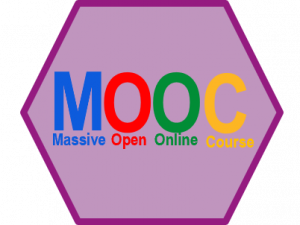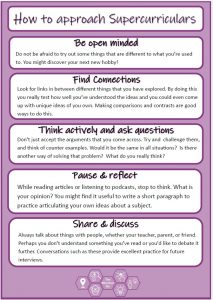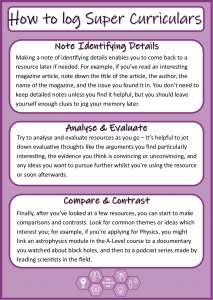Super-curricular activities are those that take the subjects you study further, beyond that which your teacher has taught you or what you’ve done for homework. (Oxford University)

In addition to good grades, the most effective way to demonstrate your commitment to learning and passion for your subject is to show that you have worked consistently and independently outside of the classroom and beyond your A level and BTEC curriculum, and that you have genuine interest in your chosen subject.
When applying to universities and for apprenticeships, students who have completed a range of relevant super-curricular activities are more likely to receive multiple offers or asked to attend interviews.
Supercurricular activities help you to develop new ideas and opinions, critical thinking and analytical skills, they also develop your ability to understand new information from different sources – this is all great preparation for succeeding at University or Apprenticeship Study.
The range of super-curricular activities is huge, some may cost but many are free and, with the internet, you will have plenty of free opportunities to go that extra mile. Whenever you undertake a Supercurricular activitiy you should keep a record of it. Think about the impact it had on you, how it has developed your thinking or knowledge, any skills you developed, or how it inspired you and ignited a passion for the subject matter. You can keep track of all of this using the Activities Tracker in Unifrog. – it’s a lot easier to write a personal statement if the resources you want to reference are right at your fingertips.
Top 10 Super-Curricular Activities
 1. Wider Reading
1. Wider Reading
The most important and valuable super curricular activity is wider reading. It helps you to explore your subject beyond the classroom, and helps you to develop a deeper understanding of your chosen area of study and can include books, specialist magazines, journals or newspapers.
You can get subject-specific ideas about what to read by checking out the reading lists and resources from university courses in your chosen subject. – you can get some ideas from the University of Cambridge Reading Lists. When you do some wider reading around your subject try to think critically about the arguments, assumptions and evidence provided by the Author. You may also want to reflect about how it has helped you build upon your classroom learning, what did you agree with or what you didnt.
Reading quality news sources can be a useful way to encounter stories relevant to your academic interests and, more generally, to practise assessing arguments and weighing evidence. There is a handy table on the Study Skills Page with a range of sources of information. Reputable news sources include:
- Al Jazeera English
- BBC News online
- CNN online
- Daily Telegraph
- The Independent
- The Economist
- The Guardian
- The New Statesman magazine
- The Times
 2. MOOCs
2. MOOCs
MOOC is short for Massive Open Online Courses and they are mostly free. The range of online courses available is huge, from those that may be related to the subjects you are studying or ones that help to develop your soft skills.
- Alison offers a range of courses, from art to humanities.
- Coursera works in partnership with top universities and organisations to offer courses ranging from an Introduction to Engineering Mechanics to Introduction to Mathematical Thinking, and more.
- EdX has a wide selection of courses, ranging from science to languages and law. EdX was founded by Harvard University and MIT (Massachusetts Institute of Technology).
- Futurelearn partners with leading universities to provide a wide range of MOOCs.
- Udacity offers courses relating to IT and computing.
- Udemy offers a wide range of courses from photography to IT and software
- Class Central – gathers content from thousands of international Universities and Institutions
 3. Podcasts
3. Podcasts
Not everything has to be read – catching up with podcasts and recorded lectures is an accessible way to dig deep and get an introduction to new ideas and the great thing is you can listen anywhere – why not utilse your school bus journeys or listen while you workout – multi-tasking at it’s best!
- University of Oxford Podcasts
- University of Cambridge Podcasts
- BBC Podcasts
- BBC World Service
- Radio 4 – In Our Time
- Radio 4 Latest Podcasts
- Clever Podcasts with Creative Visionaries
- University of Warwick Podcasts
 4. TED Talks and Lectures
4. TED Talks and Lectures
TED is a global community established in 1984 as a conference for Technology, Entertainment and Design – it has now developed to cover almost any topic from science or business to global issues. Ted-Ed offers high-quality, interactive, video-based lessons.
- Gresham lectures either in person or online can deepen your knowledge and develop new ideas, concepts and perspectives that can be used and referenced in exams, coursework (including EPQs), and at interviews
- Jesus College Oxford – On-line Lectures
- University Taster Days and Taster Lectures
- Conway Hall Ethical Society Lectures
- London School of Economics and Political Science Lectures
- Sutton Trust Summer School
 5. Films & Documentaries
5. Films & Documentaries
Films and documentaries are a great way to to access a wider understanding of a subject. They are a powerful way of presenting multiple perspectives in engaging and emotive ways. Films and documentaries enable you to gain a better understanding of, and empathise with, the life experiences of individuals and communities far removed from your day-to-day reality.
- Top Documentary Films
- Royal Shakespeare Company – watch Shakespeare for free
 6. Competitions
6. Competitions
It is a great idea to enter a competition in an area that you enjoy or or in a subject you are interested in. There are competitions for every subject at all levels. Usually this will be in the form of an essay competition for arts and humanities, but there will be design competitions, creative competitions and pure skill against the clock competitions. It really doesn’t matter whether or not you win, it’s about what you have learnt. Speak to your teacher for more information on current school and national competitions. If you win or are placed this is excellent, but even if you don’t it demonstrates commitment, interest, drive and immediately differentiates you from others.
- Minds Underground provide links to a range of academic essay and subject specific competitions
 7. Debating
7. Debating
Debating provides a unique and stimulating platform for honing essential skills that are highly valued in the workplace. By debating real-world issues, you are introduced to key controversies at the top of the public agenda and you will go beyond the media headlines and delve deeper into the biggest issues confronting society. Debating is an effective way to build self-confidence, especially in public speaking and expressing your opinions. Debating regularly can help you to overcome stage fright and develop your ability to speak confidently in front of others. If you embrace debating it can equip you with sought-after skills and qualities that can drive your career success.
- Debating Matters is a National Sixth Form Debating Competition
 8. Volunteering
8. Volunteering
Volunteering is a great way to get experience of workplaces and gain a range of tranferable employability skills whilst giving back to the community and helping those most in need. You may want to volunteer for a cause that’s close to your heart or a one that is linked to your future career aspirations. The following sites will help you start to think about volunteering and find places who are looking for helping hands:
- V-inspired is a national charity that links young people with volunteering experiences in their local area
- Our Gateshead
- The Volunteer Centre, Newcastle
- Get Volunteering Tyne & Wear
- Durham Community Action
- Gateshead Health Volunteers
- Newcastle Hospitals Volunteering
- County Durham and Darlington NHS Volunteers
 9. Work Experience
9. Work Experience
One of the best super curricular activities is a part-time job because it shows that you are independent, motivated, and can manage your time effectively. If you don’t have a part time job we have scheduled time for you to take part in Work Experience. This will provide you with the opportunity to experience working in the real world, test out your possible career choices, or try something new. It’s a great for learning and developing workplace skills, understanding how organisations operate as well as helping you to understand your strengths outside of school. Many universities and apprenticeship courses expect that you will have completed some form of work related experience and it can be an entry requirement to the more competitive courses. There’s more information on our Work Experience page
 10. Visits
10. Visits
Trips and Visits will provide you with an opportunity to explore your subject in more depth and learn about new places, cultures, and ideas outside the classroom which will provide you with a more comprehensive understanding of your subject matter. Your teachers and Sixth Form Team will keep you updated on opportunities for visits to universities, exhibitions, open days etc, but you may also want to think about visits to theatre, museums, galleries, sites of historic or scientific interest, along with companies or organisations who operate in the field of work that you hope to specialise in later. The Super Curricular booklet will have examples of subject specific visits.
 More On-Line Resources
More On-Line Resources
- University of Cambridge – Supercurricular supporting your application
- University College Oxford – Exploring beyond the syllabus
- University of Cambridege have developed My HE Plus – a site which will help you to go beyond the school curriculum and discover their passion for a subject
- Hartford College, Oxford – Super curricular Online Resources
- Oxford Royale Academy – 34 Best Super-Curricular Activities for Applicants to Top Universities
- Staircase 12 from University of Oxford has a wealth of an online resources and information with lots of ideas to help you extend their knowledge beyond the school syllabus.
- Oxplore offers you the opportunity to engage with debates and ideas that go beyond the classroom. A wide range of subjects are covered, from archeology to zoology, and are all linked to the latest research being carried out at Oxford University
- Supercurricular Ideas for Aspiring Law Students
- St Hilda’s College, Oxford: Biology SuperCurricular Resources
- Worcester College, Oxford Guide to Supercurriculars
- Things We Don’t Know – Explaining the Questions Scientists are trying to answer
- Medical Mavericks –
How to approach Supercurricular activities & Record what you’ve done
Don’t do an activity just because you think it looks good. Read books and take part in things that you think are genuinely stimulating. This means that you avoid having to try hard to fake interest. Pursuing super-curricular activities should never become a chore. Here are some top tips from the University of Oxford, to help you engage with super-curricular resources in your subject:



